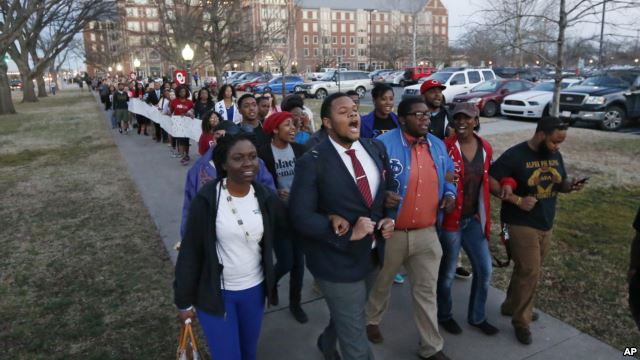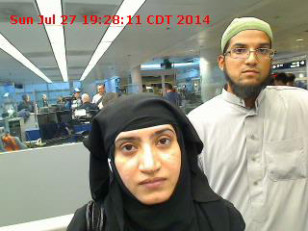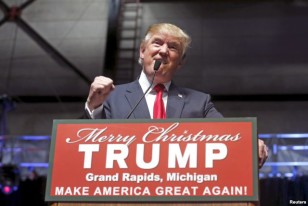As 2015’s final minutes tick away, it’s gives us a chance to look into the mirror to see what we are leaving behind. Many philosophers have noted that history tends to repeat itself.
Terrorism. Gun violence. Racial tensions. Religious differences. Politics. The environment. So we reflect on the events and trends of 2015 in hopes of identifying patterns, learning from the mistakes of the past and building on its successes to take on many of the same challenges in 2016.
The Moments in 2015 that Made Us Realize Racism Isn’t Going Anywhere
Yesha Callahan – The Root
If there’s one thing that 2015 has taught us, it’s that racism isn’t a thing of the past; it’s a thing of the present. The idea of a post-racial America is just that: a novel idea, but one that isn’t going to become reality anytime soon. National incidents and specific people put racism in the spotlight this year, and one of them is even running for president. …
University of Oklahoma students march to the now closed University of Oklahoma’s Sigma Alpha Epsilon fraternity house during a rally in Norman, Okla., March 10, 2015. A member of the fraternity was seen on a viral video chanting racial slurs
This year, campuses across the country put race at the forefront of higher education. There were the racist frat bros of Sigma Alpha Epsilon at the University of Oklahoma who thought that singing “There will never be a n–ger SAE” would go unnoticed. Little did they know that their little song on a bus would go viral. …
In June, Dylann Roof opened fire on a prayer group in the historic Emanuel African Methodist Episcopal Church in Charleston, S.C. In the aftermath, nine people—including the Rev. Clementa Pinckney—were killed. Roof’s reasoning for the shooting was that he wanted to start a race war. And he failed.
2015: The Year Of “Cops On Camera”
Matthew Feeney – Forbes
The end of 2014 was also when The Associated Press’ annual poll revealed that American editors and news directors considered police killings of unarmed blacks to be 2014’s top news story, beating the rise of the Islamic State (IS) and the Ebola outbreak.
Warning: graphic video of shooting death of Laquan McDonald:
While the IS did top this year’s Associated Press poll, police killings continued to make headlines in 2015, with the deaths of Walter Scott, Samuel DuBose, Freddie Gray, and others sparking protests, debates, and the significant growth of the #BlackLivesMatter movement. These deaths also inspired widespread discussion about the use of police body cameras, and in the coming years 2015 may well come to be known as the year of “cops on camera.”
Paris, San Bernardino, Law Enforcement and Encryption
Rep. Jerry McNerney (D-Calif.), Rep. Bill Foster (D-Ill.), Ronald Rivest and Martin Hellman – The Hill
The terrorist attacks in Paris followed by the Dec. 2 mass shooting in San Bernardino have sickened us all and forced us to ask what more might be done to prevent future such disasters.
Tashfeen Malik, (L), and Syed Farook are pictured passing through Chicago’s O’Hare International Airport in this July 27, 2014 handout photo obtained by Reuters.
One concern that has been raised is that terrorists and criminals may have used encryption to “go dark,” so that our law enforcement and national security personnel could not listen in on what they were planning. The Paris attacks led FBI Director James Comey, CIA Director John Brennan, Manhattan DA Cyrus Vance, and others to renew their call for “exceptional access” – the ability to unlock encrypted data on devices made by companies such as Google and Apple.
Sounds reasonable, right? But, closer examination reveals that providing that kind of access may not be possible, and if it were, it would open up vulnerabilities that would make us less safe in other ways.
The Global Economy Confronts Four Geopolitical Risks
Martin Feldstein – Project Syndicate
The end of the year is a good time to consider the risks that lie ahead of us. There are of course important economic risks, including the mispricing of assets caused by a decade of ultra-low interest rates, the shifts in demand caused by the Chinese economy’s changing structure, and European economies’ persistent weakness. But the main longer-term risks are geopolitical, stemming from four sources: Russia, China, the Middle East, and cyberspace.
Secretary of Defense Ashton Carter flies in a V-22 Osprey after visiting the aircraft carrier USS Theodore Roosevelt, Nov. 5, 2015. (Dept of Defense Photo)
What We Learned from Donald Trump in 2015
Stephen Collinson – CNN
In a riotous six-month carnival of political incorrectness, Donald Trump has fused his message to the mood of his seething supporters like no other candidate and defied the conventions of a political game under whose rules he should have faded long ago.
Few in Republican Party politics believed when Trump launched his improbable White House bid in June that he’d still be a factor — much less the factor — at the end of the year…. Trump has already proved that he possesses one of the most valuable political attributes: the ability to sense something stirring in the electorate before anyone else.





